Publication:
Who counts in poverty research?
Author(s): Edmiston, D.
Journal: The Sociological Review
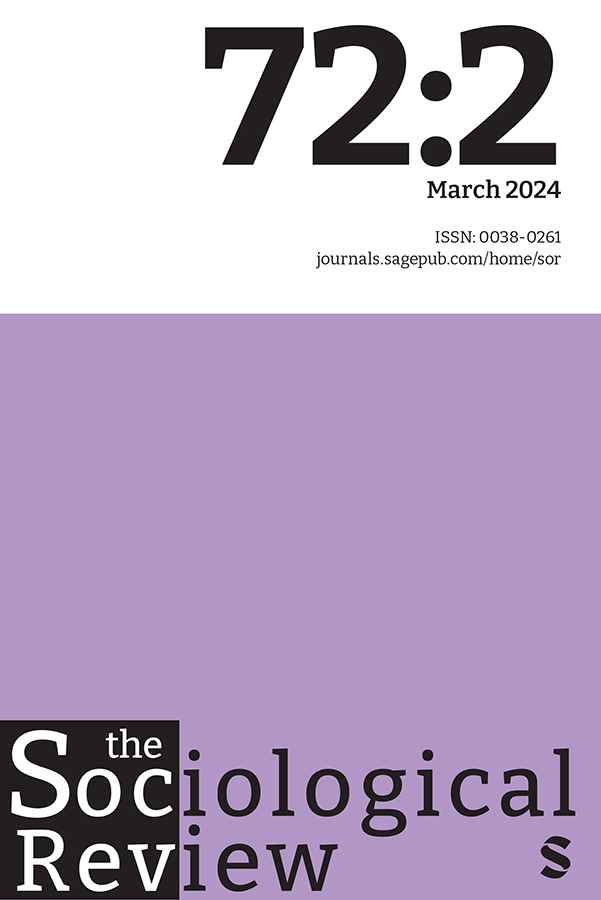
.
Abstract. Mainstream poverty analysis currently renders certain people and degrees of privation more socially legible than others across high-income countries. This article examines how these hierarchies carry through to and corrupt wider social scientific analysis, inscribing differential value to actors and phenomena in ways that undermine social understanding and explanation. First, conventional approaches to poverty analysis and measurement obscure the de facto prevalence of deep poverty, as well as those most subject to its violence. Second, a growing number of hyper-marginalised groups are missing from population income surveys, undermining the accuracy of (deep) poverty estimates and public understanding of both its determinants and dynamics. Third, the inferential and external validity of income surveys is significantly diminished by problems surrounding data quality and coverage. Attempts to address this have principally focused on improving data quality, but as demonstrated in this article, these strategies exacerbate poor representation of the lowest-income groups in distributional analysis. Much more than merely technical or pragmatic, these are theoretical and normative judgements about who counts in welfare policy and politics. Overall, I demonstrate how current data practices occlude some the most violent forms of denigration and exploitation that structure advanced marginality, particularly the gendered, racialised, bordering and ableist practices underpinning state–citizen dynamics. Focusing principally on the UK context, I argue that the epistemic erasure committed features in and systematises a policy blindness to deep poverty for some of the most marginalised social groups making it harder to evidence its effects and address its causes across high-income countries.
Working Paper:
The distinctive nature and effects of deep poverty: a hybrid case for Minimum Income Schemes
Author(s): Edmiston, D. and Alcañiz Colomer, J.
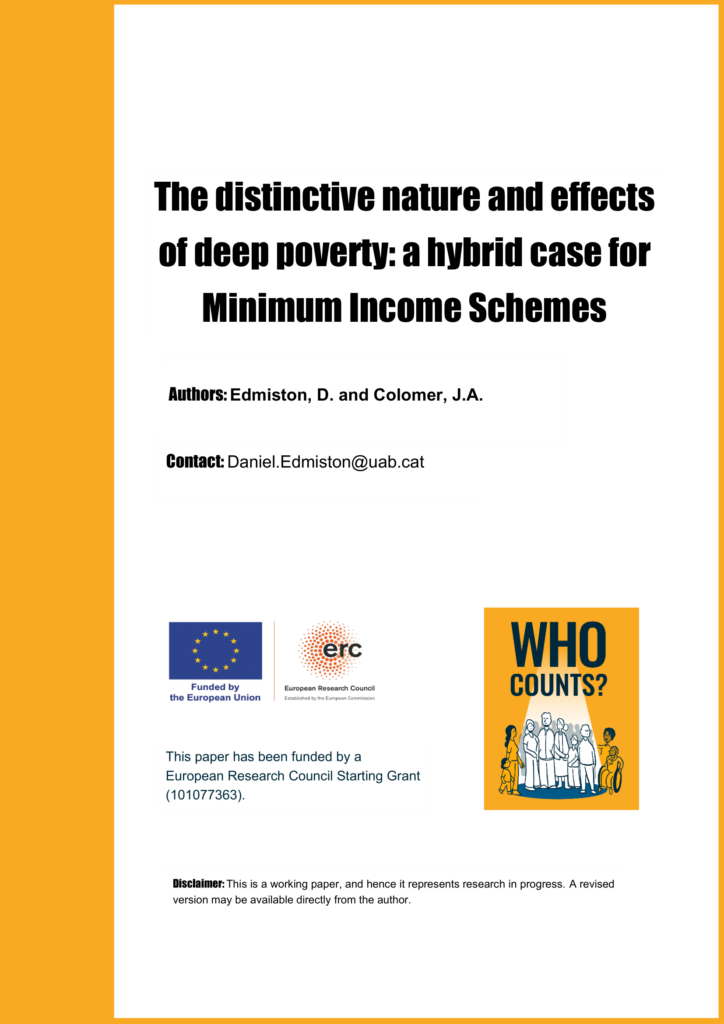
.
Abstract. Where should finite resources be targeted when tackling poverty? To answer this question, this article draws on new analysis of the largest nationally representative household panel study in the UK to explore what bearing shallower and deeper forms of poverty have on financial trajectories, as well as health and well-being. We find that deep poverty as a “social kind” is considerably and consistently harder to escape, as well as more damaging to mental health and well-being over time. Transient experiences of deep poverty also prove more damaging than chronic, shallower forms of poverty. As such, we present evidence of distinct and profound effects of deep poverty that offer new grounds upon which to justify, time and target policy interventions across the low-income distribution. We employ income-based, material deprivation, and multidimensional measures of poverty, with the latter providing the most robust results for identifying the distinctive nature of deep poverty. The evidence presented helps establish an empirically informed case for Minimum Income Schemes (MIS) and the relatively superior returns on public social spending these could offer on both prioritarian and consequentialist grounds.
Working Paper:
Singled Out: Household Types, Poverty Risk and Welfare Effectiveness Across Europe
Author(s):
Edmiston, D., Tucci, V., Aldama, I., Alcañiz Colomer, J., Orujova, L.,
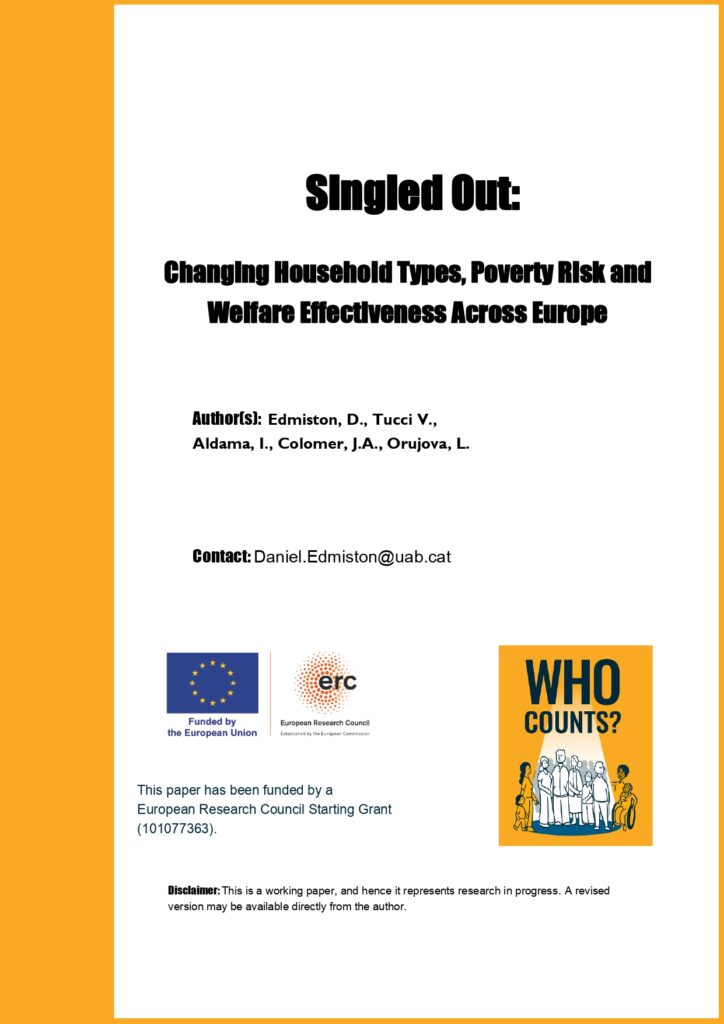
.
Abstract. Europe has experienced a significant rise in single, childless households of working age in recent decades. This presents a challenge to European welfare states that have typically tended to prioritise social security and anti-poverty spending around family-based and lifecycle needs. In response, this article critically considers the existing scholarship that has appraised the role of family as caregiver and gatekeeper in European social policy to date. Drawing on microdata from 25 countries included in the European Union Statistics on Income and Living Conditions, we examine the effectiveness of tax and transfer systems in tackling poverty amidst considerable changes in household types and composition across Europe. Overall, we find that European tax-transfer systems do a better job of poverty alleviation amongst households with children than they do amongst single, childless households of working age. However, we find considerable variation and important fault lines according to levels of (de-) familisation, welfare adequacy, labour market attachment and whether a household receives disability-related social security. Our findings illustrate the need to move beyond an examination of the absorptive functions of family to consider how household structures determine access to, and adequacy, of working-age welfare.
Working Paper:
Trust, Poverty and Welfare Receipt
Author(s):
Alcañiz Colomer, J., Edmiston, D., Aldama, I., Orujova, L., Tucci, V.
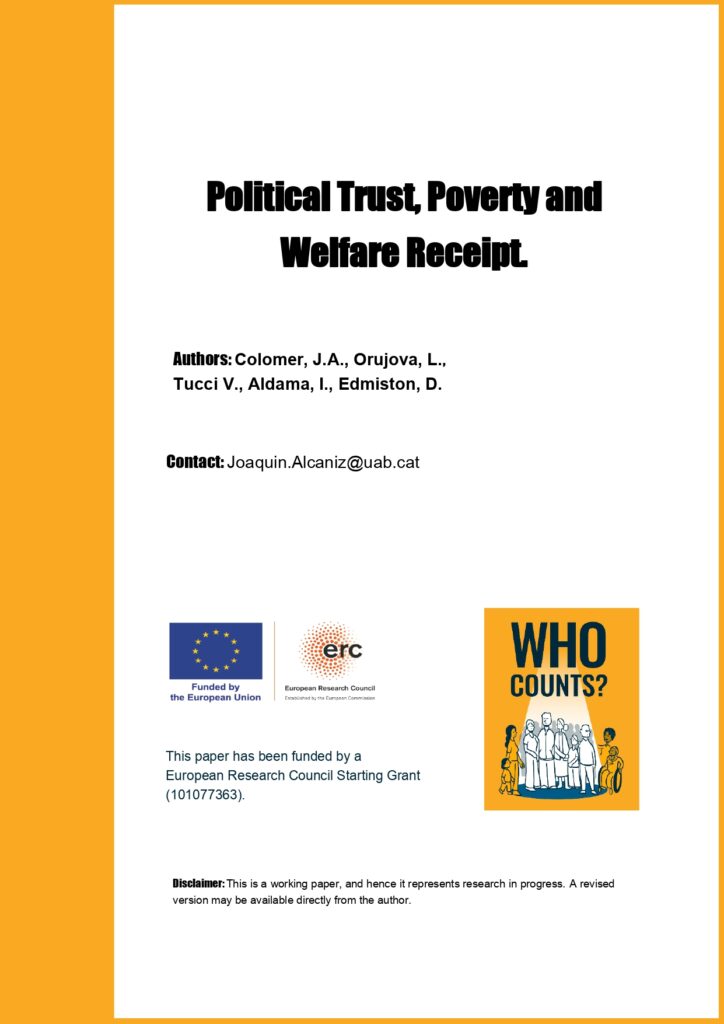
.
Abstract. Existing research highlights the importance of the quality of contact with welfare state services in fostering political trust and, in turn, political participation. However, less attention has been paid to how these dynamics unfold for the most economically disadvantaged: individuals who are most exposed to and dependent on government action but, somewhat paradoxically, often have less political power and influence. In response, this paper draws on cross-sectional data from a unique EU-SILC module to examine the relationship between poverty and political trust, and how this is affected by receiving different types of welfare. Rather than simply distinguishing between ‘the poor’ and ‘non-poor’, we differentiate between varying degrees of poverty (drawing on both indirect and direct measures), allowing for a more nuanced analysis of effects. Our analyses show that, individuals in the most vulnerable economic situations exhibit lower levels of political trust, and the same is true for those receiving social exclusion-related benefits, but not those receiving other forms of assistance who exhibit higher levels of political trust. We discuss these results in terms of gaps in welfare coverage and adequacy, as well as factors affecting welfare state engagement, such as administrative burden. These findings are particularly relevant given the low levels of political participation among people in poverty and the role of trust in shaping democratic engagement. They suggest the existence of a potentially vicious cycle: insufficient and burdensome welfare benefits undermine recipients’ political trust, which in turn reduces political engagement and voice—ultimately reinforcing social and political exclusion.
Working Paper:
Exploring the Relationship between Poverty Persistence and Depth: evidence from across Europe
Author(s):
Orujova, L., Edmiston, D., Colomer, J.A., Aldama, I., Tucci, V.
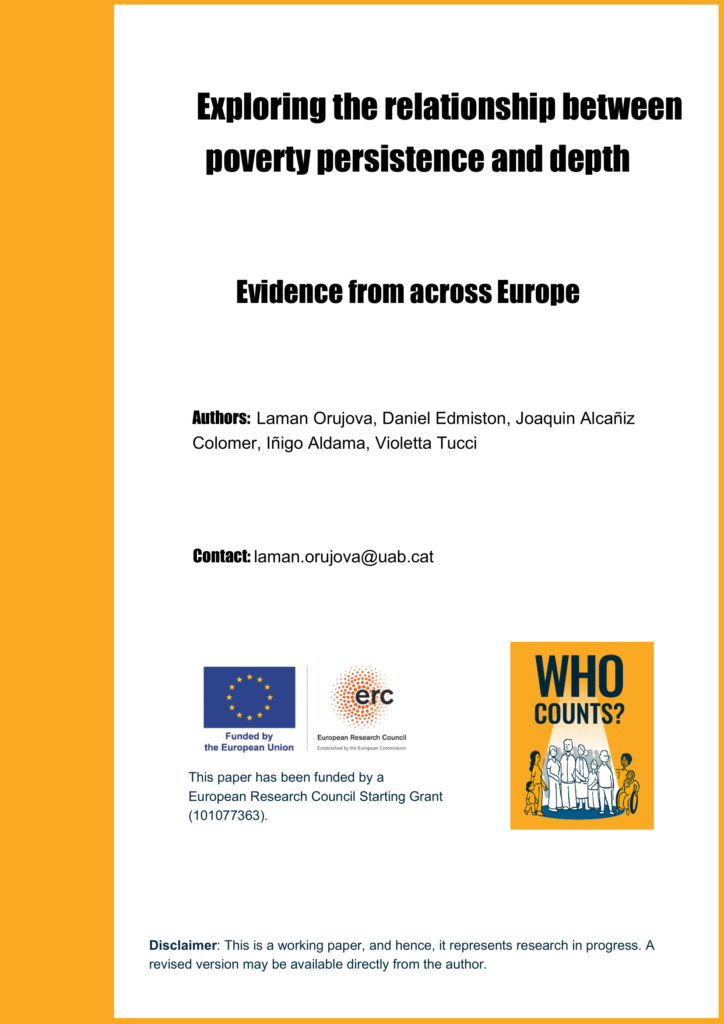
Abstract. The poverty status is not static; individuals enter and exit poverty and destitution throughout the course of their lives. Many scholars have acknowledged the dynamic nature of income poverty and attempted to measure and estimate the persistence of poverty. Existing empirical literature shows significant levels of poverty persistence across European countries. However, recent studies assume that poverty is a “short-memory process”, that is, only considered from one period to another. Moreover, many do not take into account the depth of poverty while analysing poverty persistence. Although the “scarring effect” of poverty is recognised by these studies, i.e. how entering and staying in poverty can lead to a vicious circle of chronic/persistent poverty, the analysis rarely explores the potentially deepening poverty among those who stay poor. This paper aims to contribute to the literature by addressing these caveats by answering the following questions: Does being in (shallow) income poverty for longer periods lead to a transition into deeper forms of income poverty? Who is at the most risk of falling into deep poverty among the nonpoor or persistently poor? For this purpose, we utilise recent longitudinal waves of the EU-SILC dataset, and several European countries with various social policy regimes are chosen for the analysis.
Working Paper:
At the margins of measurement: housing insecurity and inclusion in official poverty statistics
Author(s):
Tucci, V., Edmiston, D., Colomer, J.A., Aldama, I., Orujova, L.
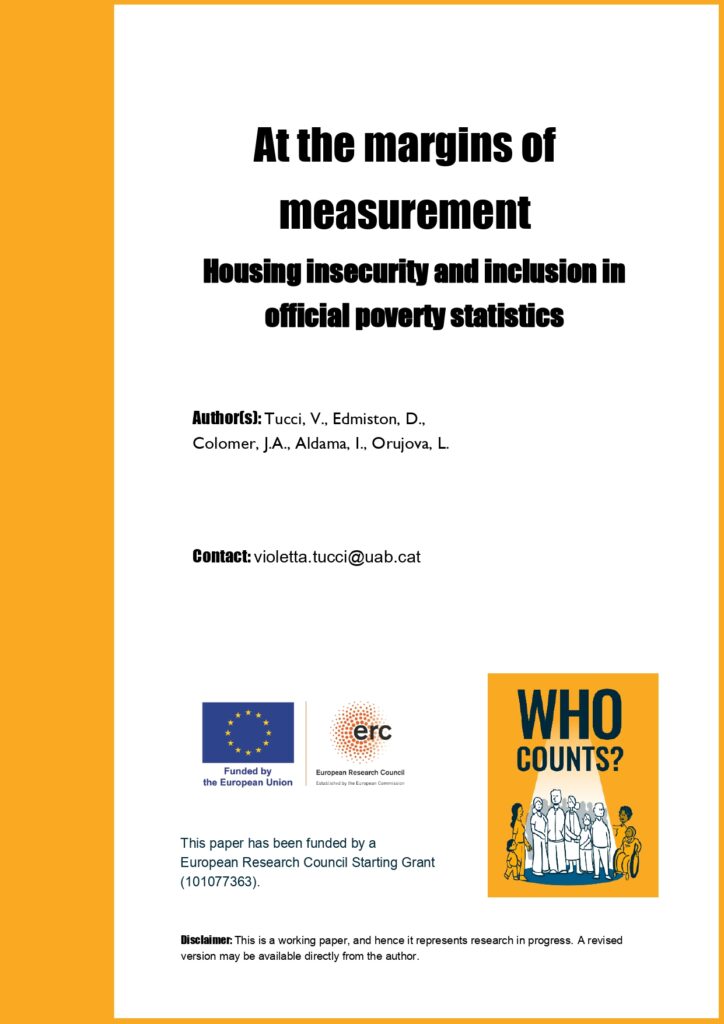
.
Abstract. The private household is a central unit of analysis and intervention in poverty research and social policy analysis. Individuals without stable private addresses often face barriers to research inclusion and accessing public services. Housing insecurity—a fundamental factor influencing inclusion in income surveys—is crucial to understanding poverty’s extent and dynamics. It represents a continuum, from severe insecurity leading to homelessness and exclusion from surveys to less severe forms causing non-response bias or under-representation. Individuals facing multiple housing insecurity dimensions—defined as deep housing insecurity—also experience higher eviction risks and potential transitions from private to non-private households. Housing insecurity thus extends beyond a simple housed-versus-homeless binary, with unstable housing relationships impacting visibility in poverty research and policy evaluation. Analyzing degrees of housing insecurity provides insights into vulnerable populations and their inclusion or exclusion from poverty statistics. This study investigates socio-demographic characteristics linked to (deep) housing insecurity and implications for poverty analysis in Europe. Using EU-SILC data (2023) and Spain’s Survey on Homeless Persons (2022), we examine profiles and risks of: (i) individuals who previously experienced severe housing insecurity but re-entered the survey sample, and (ii) individuals currently facing deep housing insecurity, at risk of eviction and transitioning out of the survey sample, and (iii) individuals currently experiencing severe housing insecurity who transitioned out of the survey sample. The analysis clarifies who is counted or uncounted, assessing existing poverty estimates’ validity in Europe.
Working Paper:
Out of Frame: Investigating Social Rights Access by Non-Private Household Sub-Groups in European Welfare Regimes
Author(s):
Aldama, I., Edmiston, D., Colomer, J.A., Tucci, V., Orujova, L.
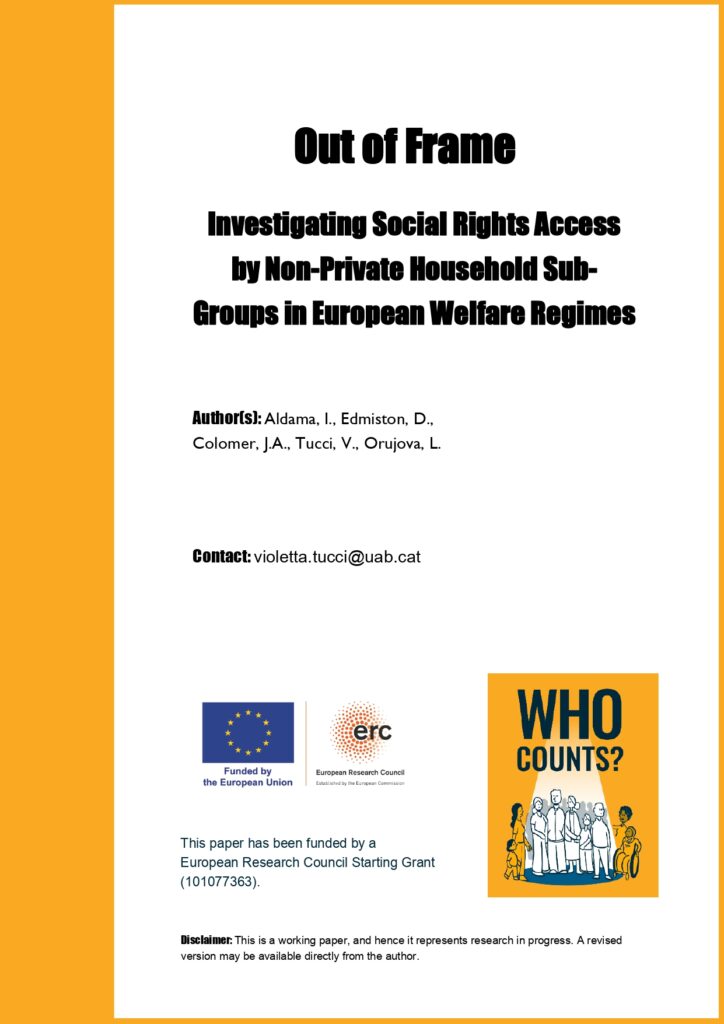
.
Abstract: Non-Private Household (NPH) sub-groups—including individuals living in nursing homes and long-term care facilities, hospitals, hostels, homeless shelters, emergency accommodation, prisons, student halls and defence establishments—are highly dependent on welfare services, receiving considerable amounts of social policy energy, resources and attention. Yet, we know surprisingly little about their living conditions, transitions and, in turn, how policy design and implementation affect them. Resultantly, we consider how legal frameworks, policy design and implementation determine access for those sub-groups. First, the regulation of legal statuses and citizen differentiation within states crucially delimitates the extent to which individuals are entitled to welfare access. Second, macro-institutional designs influence the distribution and accessibility of social rights to varying degrees. In this respect, those outside traditional household structures and labour market trajectories often fall through the gaps in regime logic, particularly as individual responsibility and conditionality are emphasized. Third, we expect frictions in social policy delivery to be particularly consequential for NPH sub-groups since they have been observed to be more detrimental for groups with fewer resources, therefore reinforcing patterns of inequality. Data sources on the living conditions and welfare access of non-private-household sub-groups are poorly integrated and highly variable in terms of both data quality and coverage. To address this, we review and impute data from surveys, national accounts and administrative data, with the aim of enhancing comparability across sources and deepening our understanding of how systemic and institutional factors interact to shape welfare accessibility for NPH populations, an area that has been persistently overlooked in scholarship. In doing so, it not only expands the empirical scope of welfare regime analysis but also offers a critical framework for assessing the inclusiveness, equity, and normative underpinnings of social citizenship in contemporary Europe.